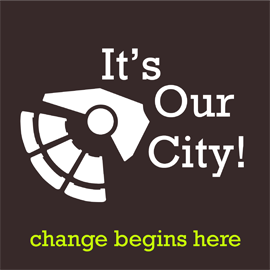IT’S OUR CITY! – COMMENTARY AND EVIDENCE
FROM ‘STRONG LEADER’ TO MORE DEMOCRATIC MODERN COMMITTEE GOVERNANCE IN SHEFFIELD – COMMUNITY PERSPECTIVES
Submitted to the Overview and Scrutiny Management Committee for consideration at the meeting 28th November, 2019
1. INTRODUCTION
1.1
This commentary and evidence paper is the result of almost 20,000 conversations with Sheffield citizens carried out during the successful Sheffield People’s Petition campaign, coordinated by the community group It’s Our City! (The purpose and aims of It’s Our City are in Appendix C.) It is the exceptional response of Sheffield communities and their overwhelming aspiration to see more democratic council governance that has resulted in the statutory requirement for the city council to develop a modern committee system governance alternative – for the Sheffield electorate to vote on in a city-wide referendum in May 2020.
1.2
Whilst wholly rooted in the voices of Sheffielders, the paper is supplemented with our own observations, investigations and analysis in relation to the operation of the ‘strong leader’ model in the city, and in looking to the design of a modern committee system. As successive governments have emphasised technical and legal aspects of governance such as financial prudence, value for money and risk management in a more complex and challenging environment, substantive and meaningful aspects of governance can get lost. But, “ultimately local government exists to deliver services to their local communities shaped by the wishes of the local electorate and service users” (Committee of Public Accounts 2019, p.11). A Sheffield community perspective on council governance asks the question: to what extent are citizens at the heart of, and listened to and enabled to effect and exercise power and influence over decisions that affect our lives, in our (diverse) communities and environments, and in the way we all live together and care for each other? (See Lent and Studdert 2019).
1.3
Section 2 is the summary community principles for a modern committee system – drawn from 20,000 conversations. Sections 3,4, and 5 provide commentary and evidence and they focus on two broad bottom-line requirements for a modern committee governance model – fair and meaningful representation, and (community) involvement and impact. This primary focus is not to neglect cultural change – certainly a more open, collaborative and deliberative culture is needed in the way the council operates, with a commitment to power-sharing – and this also runs through the text. Nor is it to diminish the need for people to see and effect actual change, and a range of
mechanisms and processes that can help to genuinely demonstrate this (impact). However, the immediate thrust of the paper focuses on the urgent task the committee is charged with, that appears to be in relation to establishing design principles for a modern committee system.
The whole document can be found here: https://itsoursheffield.co.uk/wp-content/uploads/2021/06/ioc-evidence-and-community-principles-for-a-modern-committee-system-final-working-paper.docx (updated in April 2021)
